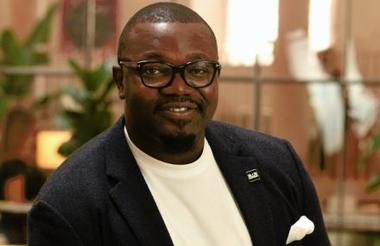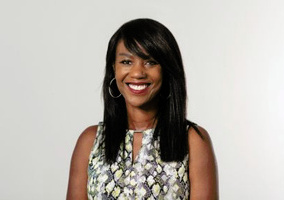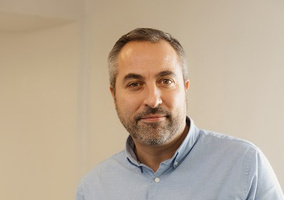Duro Oye found his way into the charity sector because of six rival gang members.
He had been shooting a documentary in 2012 to showcase the gang members’ lives in south London. After filming for 18 months, he developed a bond with his film subjects and began mentoring them informally.
Oye discovered a new avenue of joy in youth mentorship as he conducted those sessions with them.
Through word of mouth, more young people came to Oye for mentorship. He tried to fit them in on top of his full-time job and other life obligations however he could.
Founding an organisation
Oye’s experience as a mentor led to the creation of his charity, 20/20 Levels, which provides support for Black and racially underrepresented young people in London to break into the professional workforce, build their own business or find their career paths.
In the early days of his organisation, due to a lack of space, Oye conducted his workshops in places like public parks, churches and nightclubs in central London outside of their opening hours.
The nightclubs didn’t have screens, so Oye had to stick documents onto the speakers with blue tack.
“It was a really interesting time,” he says. “We literally used to ask anyone that we knew who had space.”
Apart from the lack of space, Oye also didn’t have the right structure and requirements in place to form a charity, so he initially registered as a community interest company (CIC), which became a charity in 2023 after a merger.
When Oye applied for funding from trusts and foundations, he says many rejected his proposals as he didn’t have any experience working in the third sector, which didn’t make him credible.
So, Oye ran the organisation on his personal funds for the first five years.
To cover his expenses and keep the organisation afloat, he worked a full-time job and freelanced in film and video production for weddings and other events on the side.
He delivered mentoring sessions to the young people for two evenings a week, and recruited new people into the programme.
It was difficult for Oye to find a work-life balance as he worked 10 to 14 hours a day and reduced his monthly outgoings to the bare minimum.
“I got by on what I could, and every penny of my additional funds went into building the organisation and being able to deliver everything that we were delivering,” he said.
“It was very, very rough and very difficult, but if I didn’t do it, then we wouldn’t have an organisation now.
“It’s not advice that I give to young people because your wellbeing is hugely important. I was in a position where I could do that. I had the support system in my family.”
A strong corporate relationship base
Oye managed to put a board in place at his CIC and got some non-executive directors to join his organisation.
“I was really adamant that I wanted to prove the concept, shout about our impact, and hope and pray that one day a corporate company would be aware of what we were doing and then decide to fund our work,” he says.
Then came his first breakthrough in 2018, when the general manager of US shoe company Converse read about his organisation’s initiatives in the London Evening Standard while on the train home.
The general manager met with Oye for a meeting soon after, which led to his organisation’s first corporate partnership. It was also Converse’s first partnership with a community organisation.
The partnership gave Oye a space in Converse’s London office to conduct his workshops, provided him with a part-time salary and allowed him to hire two part-time staff.
His second breakthrough came a year later in the form of a one-year grant from the Fore Foundation, which allowed Oye to quit his full-time job and focus entirely on his organisation.
At the end of 2019, his organisation had five additional corporate sponsors, and in 2020, it had around 26.
Today, 20/20 Levels operates 60% from corporate funding, 35% from trusts and foundations funding and 5% from the revenue it generates.
Its largest charitable funder is the Julia Rausing Trust, which gives his organisation £250,000 per year.
“We’ve built a strong corporate sponsorship base, which was forward-thinking as this was pre-pandemic, and we saw the fruits of it during the pandemic, when the funding landscape dried up,” he says.
“People couldn’t fundraise in the same way, and a lot of trusts and foundations shifted their funding to Covid relief. A lot of charities felt like they needed to shift their delivery to Covid relief so that they could secure funding but we never had to do that. We’ve always stuck to our guns.”
The charity has helped more than 3,750 young people and partnered with 185 companies to drive social mobility since its inception.
It now has nine full-time members of staff, four part-time employees and “an army of volunteers”.
Legal protections in corporate partnerships
When it comes to finding the right corporate partnership, charities should consider investing in legal services before signing any contracts, Oye says.
His charity tends to write the contract agreement first and then presents it to their corporate partner, even though corporations usually have their own in-house legal services. Oye says he does this “so the contracts protect us, as opposed to protecting them”.
“If they’re the ones writing it, they’re going to write it in their favour,” he says.
After providing the initial contract, the corporate partner can then negotiate with the charity’s legal team, he says, adding that it’s vital for charities to put all their non-negotiables in the contract.
Charities should also make sure that both parties sign off on every single thing before anything goes out publicly, he says, including the charity’s intellectual property and its logos.
“Because some companies, unfortunately, just want to use your credibility and the good work that you've done,” he says.
“For us, a red flag is when companies are too quick to announce our partnership.
“We need to dot the ‘i’s and cross the ‘t’s to make sure that we are both happy and make sure that we receive the money before we announce anything.”
Charities should also make sure that the corporations’ activities align with their values, he says.
“If how the company makes their money is completely against everything that you stand for, then obviously that wouldn’t make any sense.
“We’ve turned away a lot of corporate sponsors and partners because our values weren’t aligned.”
But besides partnering with the private sector, Oye said charities need to have more collaboration with each other.
“We don’t have enough collaboration within the sector. We have a lot of sharing. People share best practice, but then how do you join up the dots?
“Because we know the funding landscape is changing. There isn’t as much money around. So we need to work together to ensure that our resources can stretch.
“We need to be a lot more creative in the ways we work. I’m a huge advocate for collaborative work. Coming from the creative industry, as a filmmaker, everything that we do is collaborative, and I'd love to be able to bring that into this industry as well.”
Related articles













